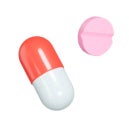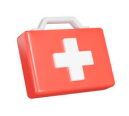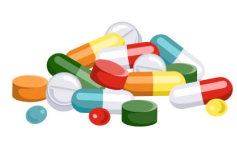Uses
What is Hydroxychloroquine for?
Hydroxychloroquine is a disease modifying anti-rheumatic drug (DMARD) used in the treatment of autoimmune diseases like discoid & systemic lupus erythematosus (DLE & SLE), rheumatoid arthritis (including juvenile idiopathic arthritis) and cutaneous vasculitis.
It is believed to disrupt the communication of various cells in the immune system and is particularly effective in treating skin and joint symptoms. It can be used alone or in combination with other medications such as Azathioprine, Methotrexate and Mycophenolate mofetil.
How should I take or use Hydroxychloroquine?
- Take this medication with or after food to reduce stomach upset.
- A typical dose ranges from 200mg to 400mg daily. Dosage may vary depending on patient’s weight and disease response.
- Hydroxychloroquine does not work immediately. It may take up to 12 weeks or longer before you can notice any benefit. Thus, it is important that you take your medication regularly, otherwise you may not benefit at all.
- Do not stop taking your medication without checking with your healthcare professional.
- Other medications such as corticosteroids, non-steroidal anti-inflammatory drugs (NSAIDs) or DMARDs may be taken with Hydroxychloroquine for the treatment of SLE and rheumatoid arthritis.
What should I do if I forget to take or use Hydroxychloroquine?
If you miss a dose, take the missed dose as soon as you remember. If it is almost time for your next dose, skip the missed dose and continue with your regular dose. Do not take double doses to make up for the missed dose.
Precaution
What precautions should I take when taking or using Hydroxychloroquine?
Inform your healthcare professional if:
- You are allergic to this medication or any of the other ingredients of this medication.
- You are pregnant, planning to conceive or breastfeeding. Hydroxychloroquine is safe to be taken during pregnancy and when breastfeeding. It is advisable to continue with this medication to prevent a flare-up of your disease.
- You are taking any other medications, including over-the-counter medicines, supplements, traditional medications and herbal remedies.
- Inform your doctor if you have G6PD deficiency.
Side Effects
What are some common side effects of Hydroxychloroquine?
-
Nausea, diarrhoea or loss of appetite
- Take medication after food to minimise the side effects. Sucking hard, sugar-free candy may reduce nausea and vomiting. Inform your doctor if symptoms are severe or if you experience loss of appetite.
-
Headache, dizziness, ringing in the ears or muscle weakness (rare side-effect)
- Improves as you get used to the medication or with dose reduction. Check with your doctor if you experience muscle weakness that spreads from your legs and upwards.
-
Blurred vision
- Transient blurring of vision may occur but this usually resolves in 1 to 2 weeks.
-
Generalized skin rash, itching, discolouration of the skin, fingernails and insides of the mouth
- Consult your doctor as these symptoms usually improve or lighten on stopping the treatment.
What are some rare but serious side effects that I need to seek medical advice immediately?
The symptoms of a drug allergy include one or more of the following:
- Swollen face/eyes/lips/tongue
- Difficulty in breathing
- Itchy skin rashes over your whole body
-
Retinal problem (uncommon at usual recommended daily dose)
- Warning signs: visual disturbances, photophobia (discomfort in bright light), light flashes and streaks, missing or blacked-out areas in the visual field, difficulty in focusing.
- It is usually reversible when the treatment is stopped. You will be referred to see an eye specialist for regular eye screening/monitoring.
-
Blood disorder (rare side-effect)
- Warning signs: unusual bleeding or bruising, lip or mouth ulcers with more frequent “flu-like” symptoms. In some cases, there may be no warning signs.
- Monitoring the effects of your new treatment is important, particularly during the first 3 months of treatment. For your safety, you need regular blood tests for monitoring.
Handling
How should I store Hydroxychloroquine?
Store in a cool and dry place, away from direct sunlight. Keep this medication away from children.
How do I throw away Hydroxychloroquine safely?
Pack this medication into a black trash bag and seal it tightly before throwing it into the rubbish chute or bin.
Disclaimers
If you take more than the recommended dose, please seek medical advice immediately. The information provided on this page does not replace information from your healthcare professional. Please consult your healthcare professional for more information.
This article is jointly developed by members of the National Medication Information workgroup. The workgroup consists of cluster partners (National Healthcare Group, National University Health System and SingHealth), community pharmacies (Guardian, Unity and Watsons) and Pharmaceutical Society of Singapore. The content does not reflect drug availability and supply information in pharmacies and healthcare institutions. You are advised to check with the respective institutions for such information.
Last updated on Jun 2022

Need More Medicine?
Use Medicine Order Service on HealthBuddy.

Medicines Reminder
Get reminders and chart progress on HealthBuddy.




















